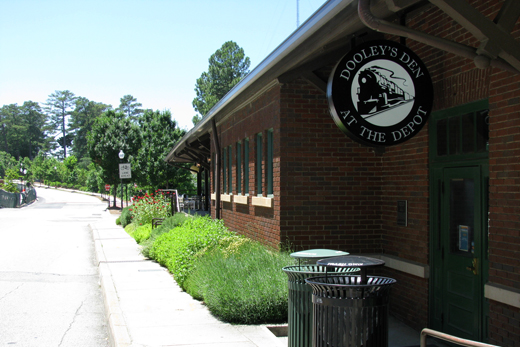The modest parking lot that stretches alongside Dooley's Den at the Depot on Asbury Circle might not look like much of a laboratory.
But starting this summer, the depot's slender parking lot — newly paved with a permeable concrete surface designed to absorb stormwater and reduce the impact of environmentally erosive runoff — will be closely watched as an experiment in progress.
Though the 0.1-acre site isn't Emory's first experience with permeable — also called "pervious" — paving on campus, it does mark the first time the surface has been employed on a heavily used parking lot, which should offer a good test case for a material touted for its environmentally friendly benefits, says Charles Rossignol, a project manager with the planning, design and construction division of Campus Services.
"Stormwater control and management is a big deal on a campus our size — the water has to go somewhere," Rossignol explains. "The challenge is to find a surface that holds up well, performs well and doesn't pose a hazard to pedestrians."
Historically, the depot parking lot featured a gravel surface, but it had become so compacted and carved with ruts and potholes that it was no longer draining properly, Rossignol says. The new paving system features a layer of permeable concrete installed over a six-inch layer of openly graded gravel, which sits atop a protective geo-textile fabric filter that prevents underlying dirt from clogging the gravel.
During a storm, rainwater will now penetrate the permeable concrete, filtering through both gravel and fabric. From there, the water will collect until it can gradually infiltrate the clay-rich soil and recharge the groundwater table, says Brent Zern, an environmental engineer for Campus Services.
In the event of especially heavy rainfall, the new lot will employ an overflow system that was integrated into the design. Excess water will flow into a French drain and be guided into a nearby swale, Zern says.
In addition, the new system offers "a filtering effect for pollutants, oil and dirt — but more importantly, it minimizes our runoff impact that can cause flooding and stream bank erosion," he adds.
"Almost half of our campus acreage is designated greenspace, so the areas we do develop are especially prone to high levels of stormwater runoff, due to the large amounts of impermeable spaces, such as roads, sidewalks and rooftops," Zern says.
"If we can come up with better strategies to manage that rainfall, we're doing Emory a lot of good," he adds.
Though permeable paving is more expensive than traditional concrete or asphalt parking surfaces, the cost was borne by Emory's Food Services Administration, which manages the lot and Dooley's Den at the Depot on land leased from CSX Railroad, says Kenny Hemmer, director of financial operations for Food Services Administration.
For years, the gravel lot had been the source of complaints, Hemmer recalls: "When Campus Services came to me with a new process they wanted to try, and when we heard that it would last as long — if not longer than — traditional materials while at the same time be better for the environment and runoff, we knew it was the right thing to do."
Installation of the new parking surface was coordinated by Walker Concrete Company and completed the week of May 13.

